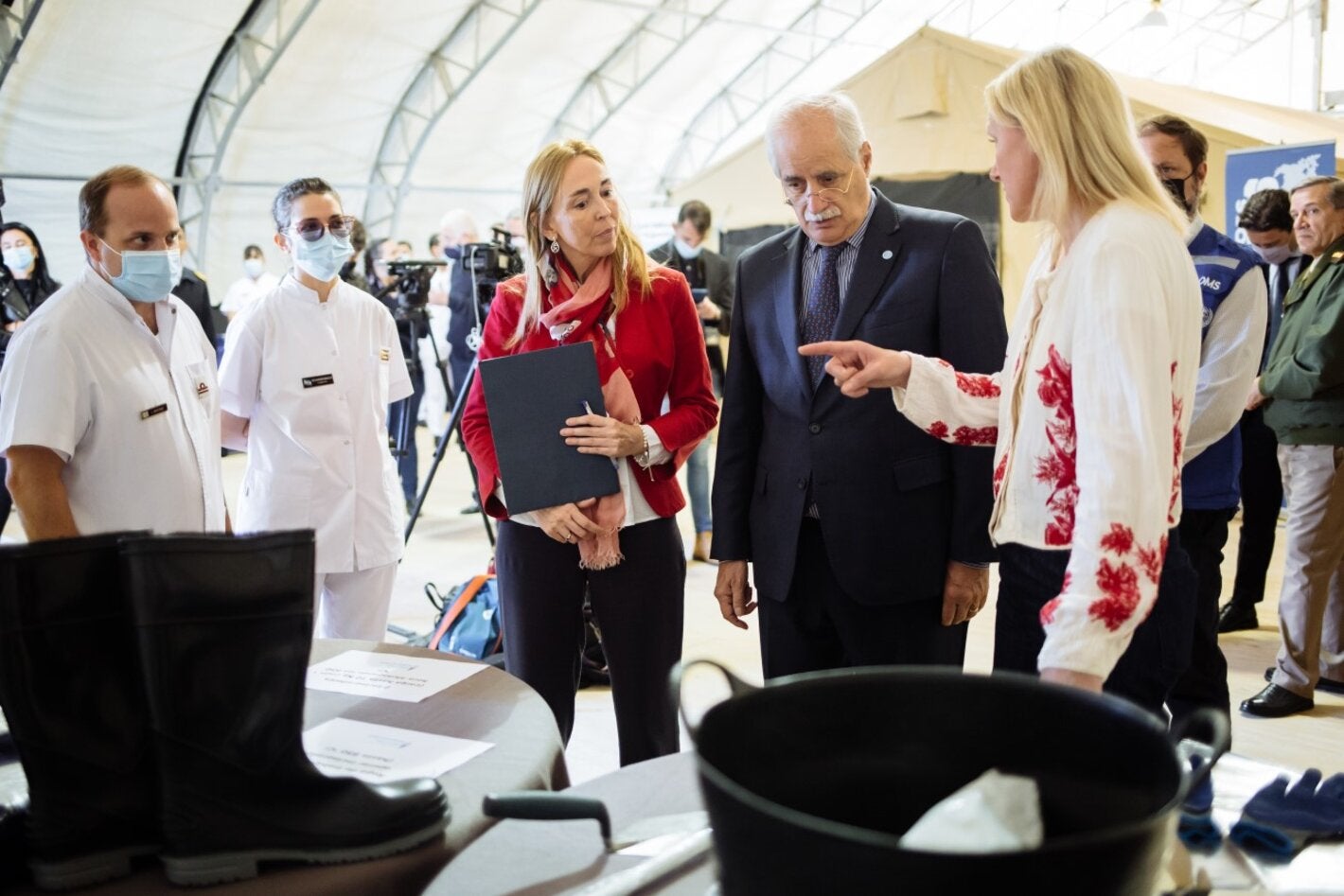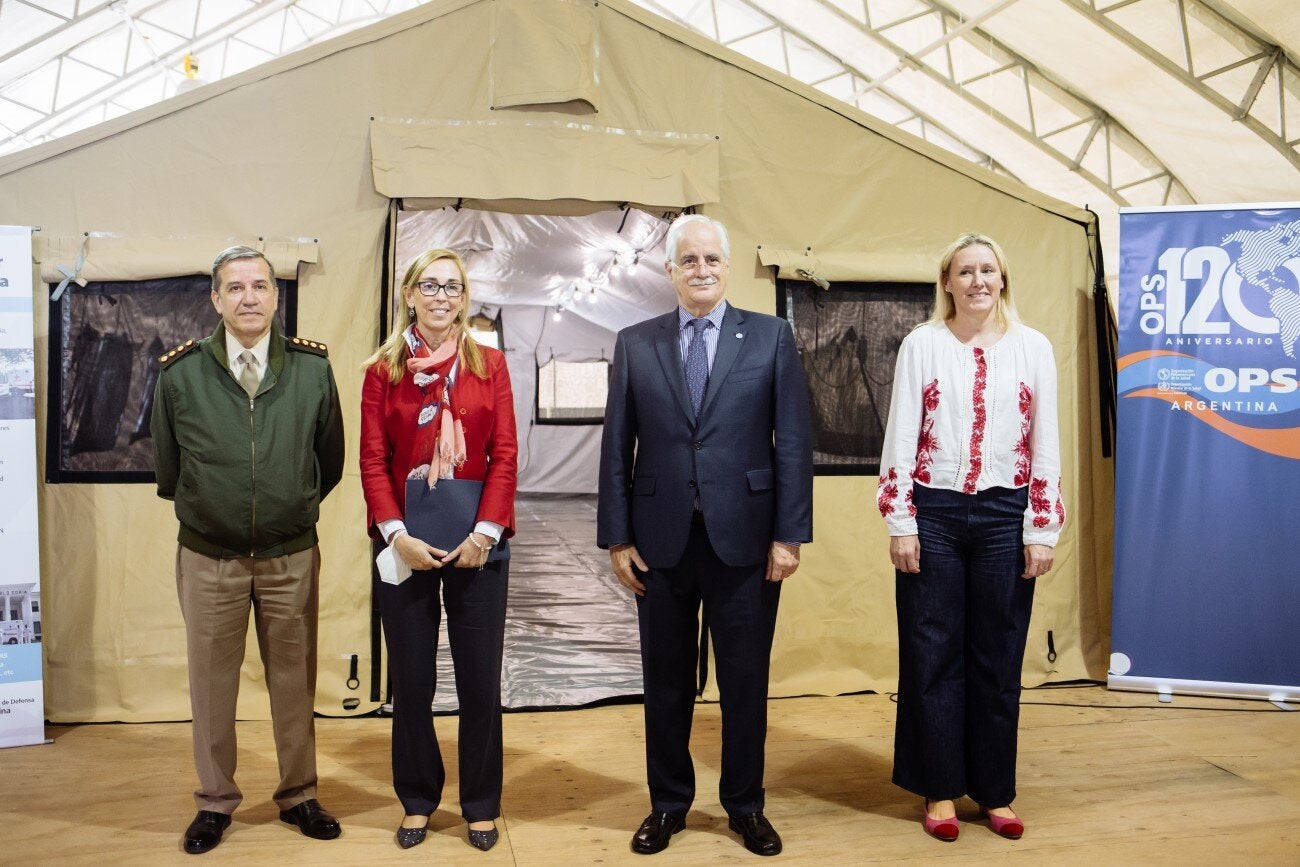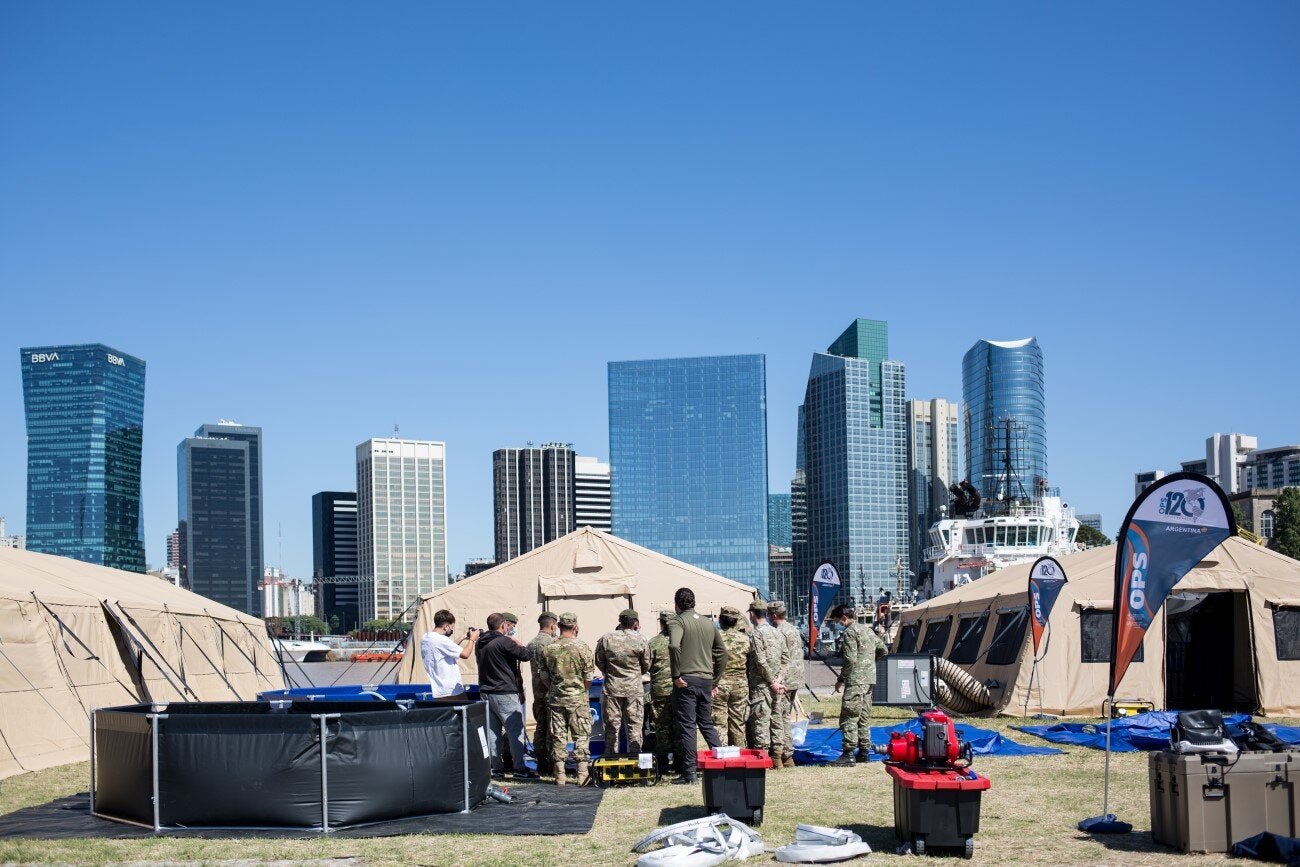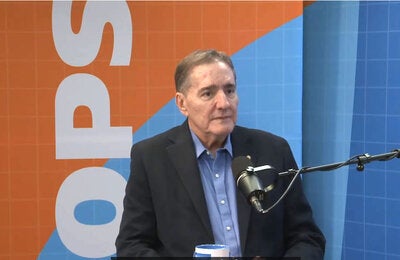
The donation to the Ministry of Defense will assist teams currently deployed to support COVID-19 vaccination efforts and strengthen their capacity to respond to future emergencies
Buenos Aires, 21 April 2022 (PAHO/WHO). – The Pan American Health Organization (PAHO) has donated a temporary vaccination module and water supply and waste management kits worth US$700,000 in order to strengthen the capacities of national emergency medical teams.
"The work carried out by emergency medical teams is essential so that health care does not stop even in the most difficult contexts. Argentina has highly qualified teams, so we hope that this donation will be an additional contribution to allow them to continue to respond to the current emergency and be better prepared for the next one," said the PAHO/WHO representative in Argentina, Eva Jané Llopis, during the delivery ceremony at the Naval Base in Buenos Aires.
The vaccination module includes five 54-square-meter tents equipped with an electric generator, toilets, sinks, showers and air conditioning. The donation also includes two water supply and treatment kits, which include tanks, water pumps, portable laboratory, and two integrated waste management kits comprise of an incinerator and other equipment.
The emergency medical teams (EMTs) are made up of professionals from different disciplines who are deployed during health emergencies and disasters to provide care to affected populations and provide support to local hospitals and health care centers.
For these teams to be able to carry out their work, especially when access to health infrastructure and services such as water and electricity is difficult, it is essential that EMTs are trained and have the appropriate equipment.
PAHO's donation will strengthen the capacities of the country's EMTs that report to the Armed Forces Personnel Wellbeing Coordination. These are currently deployed in vaccination operations to support of national COVID-19 immunization programme. The donation will also equip the teams with resources to assist the population during other health emergencies or disasters, such as floods.
"We are grateful for this very important donation to support the work of the emergency medical teams, which will be of great use," said the Minister of Defense, Jorge Taiana, while expressing his pride in the enthusiasm and dedication of all the health personnel of the Armed Forces in facing the COVID-19 pandemic. He said that the Armed Forces played a very significant role in this effort, acting in an integrated manner under the coordination of the Joint Chiefs of Staff.
This donation was made under the Global EMT Initiative of the World Health Organization (WHO), which is implemented by PAHO in Argentina. The initiative strives to ensure that emergency medical teams are trained and self-sufficient in providing an adequate and rapid response to an emergency, both within their own country and in the region.
In March, PAHO provided training on the handling and maintenance of the equipment delivered to the personnel of the Armed Forces of Argentina. The training included theoretical, technical and practical instructions on water supply, waste management and in setting up of vaccination camps. This activity was also supported by the Spanish Agency for International Development Cooperation (AECID).
Present at the handover ceremony were the Secretary of International Defense Affairs, Francisco Cafiero; the Undersecretary of Operational Planning and Defense Logistics Service, Lucía Kersul; the Coordinator of Health and Welfare of the Armed Forces, Marcela Ovejero; the President of IAF (Institute of Financial Support for Military Retirement and Pensions), Agustín Colombo Sierra; as well as the heads of the Joint Chiefs of Staff of the Armed Forces, Lieutenant General Juan Martín Paleo and of the Navy, Admiral Julio Horacio Guardia.
Equipment donated by PAHO to the Ministry of Defense of Argentina
- 1 temporary vaccination module including five 54-square-meter tents and enough non-medical equipment to set up an EMT with vaccination capacity, including storage and management capacity, as well as electricity supply, air conditioning, ventilation, hygiene and sanitation equipment.
- 2 water supply kits including equipment for the collection, storage, treatment, analysis, and distribution of drinking water in an EMT, along with wastewater collection.
- 2 waste management kits with the necessary equipment for waste collection, separation, transportation, storage and treatment. Treatment is carried out by incineration of waste at over 850ºC, except for used syringes and medicines, which are made inert and then encapsulated.
More on WHO's Emergency Medical Teams (EMT) Initiative
Emergency Medical Teams (EMTs) are teams of health professionals (medical, dental and nursing staff, physiotherapists, paramedics, and others) that provide direct clinical care to populations affected by emergencies and disasters, as well as support to local health systems.
EMTs can be both governmental (civilian and military teams) and non-governmental organizations, and their response can be national or international. They work under the global guidelines of the Classification and Minimum Standards for Emergency Medical Teams in sudden-onset disasters, and their actions focus not only on trauma management and surgical care, but also on the response to epidemics and complex emergencies. In the current context, many of these teams are engaged in the response to COVID-19, which includes vaccination and other actions.
EMT Initiative in the Americas
PAHO implements the WHO Global EMT Initiative in the region of the Americas with the objective of strengthening the capacities of these teams to care for populations during emergency situations.
Efforts are aimed at ensuring that medical teams are properly trained, self-sufficient and have the necessary and adequate equipment to be deployed quickly and provide the appropriate response to affected populations.
Actions include strengthening of EMT capacities through the delivery of equipment, training of medical personnel and team coordinators, technical advice, and the maintenance of the regional roster of EMT coordinators to be activated by the countries that require it.





